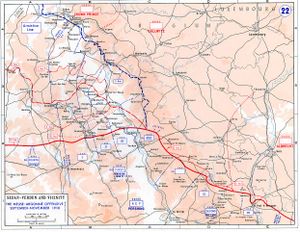

In early May, the Germans changed tactics again and made local attacks and counter-attacks the French recaptured part of Fort Douaumont but then the Germans ejected them and took many prisoners. The German offensive was extended to the west bank of the Meuse to gain observation and eliminate the French artillery firing over the river but the attacks failed to reach their objectives. By 29 March, French guns on the west bank had begun a constant bombardment of Germans on the east bank, causing many infantry casualties. Philippe Pétain ordered there to be no retreat and that German attacks were to be counter-attacked, despite this exposing French infantry to the German artillery.

By 6 March, 20 + 1⁄ 2 French divisions were in the RFV and a more extensive defence in depth had been organised. The advance then slowed for several days, despite inflicting many French casualties. Poor weather delayed the beginning of the attack until 21 February but the Germans captured Fort Douaumont in the first three days. The Germans hoped that the French would commit their strategic reserve to recapture the position and suffer catastrophic losses at little cost to the German infantry. Using the experience of the Second Battle of Champagne in 1915, the Germans planned to capture the Meuse Heights, an excellent defensive position, with good observation for artillery-fire on Verdun. The German 5th Army attacked the defences of the Fortified Region of Verdun (RFV, Région Fortifiée de Verdun) and those of the French Second Army on the right (east) bank of the Meuse. The battle was the longest of the First World War and took place on the hills north of Verdun-sur-Meuse. Click below to listen to the pronunciation on Quizlet flashcards.The Battle of Verdun ( French: Bataille de Verdun German: Schlacht um Verdun ) was fought from 21 February to 18 December 1916 on the Western Front in France. For the first, the lips should be well rounded but not pushed forward for the second, the speaker should say 'ee', and while continuing to say it, round the lips. père mène lait merci gêne jouet cachet lait maisįor English speakers, the two most difficult vowel sounds are ' ou' and 'u'.It is worthwhile getting used to the phonetic symbols used in dictionaries in order to check the precise pronunciation of new words. The English approximations are given below as a guide only. The vowels have long and short sounds, but fewer than their English equivalents, and their sounds are pure - unlike English where many of the long sounds are diphthongs (eg A = e+ee I = ah + ee). There are five vowels in written French: a, e, i/y, o, u, and these sounds can have a number of different spellings. The sound 's' is also made by softened 'c' (see above) and by 'ti' in words containing '-tion': nationalité stationnement consolation The unvoiced 'ss' ( sucre, passion, persil) or the 'z' sound when it appears between two vowels ( rose, faisons, musée). If a soft 'g' is needed before a 'hardening' vowel, an 'e' is inserted:Īs in English, the letter 's' has two sounds. If a hard 'g' is needed before a 'softening' vowel, the letter 'u' is inserted: gicler gendarme page gâteau gants golf lugubre gens.In French, as in English, 'g' before the vowels 'i' and 'e' is softened and pronounced as a 'j' (see above)īefore 'a', 'o' and 'u' it has a hard 'g' sound: When a soft 'c' is needed before a hardening vowel, the cedilla mark (ç ) is used.Ĥ SOFT AND HARD ' G ' - THE SOFTENING ' E '. cela certain ceci cimetière cantine cousin curé.In French, as in English, 'c' before the vowels 'i' and 'e' is softened and pronounced as an 's'.īefore 'a', 'o' and 'u' it has a hard 'k' sound: GN = 'ny' like the sound in the middle of 'onion'ģ SOFT AND HARD ' C ' - THE CEDILLA ( Ç ) joli joie jupe germe gicler rage région.c'est ‿ un stylo( t pronounced, s silent).fers coqs che fs (1 sounded, 1 unsounded consonant)įinal consonants will be sounded when making a liaison with a following word beginning with a vowel but previous ones will not:.mets est pieds loups(2 unsounded consonants).mars, jadIs - final consonants sounded)ĬONSONANT CLUSTERSfollow the same rules as above: There are exceptions that need to be learnt as new words are encountered (e.g. Note that the r in the infinitive of -er verbs is not sounded: parler regarder

The latter are often (but not always) sounded, and you need to check the pronunciation each time you meet a new word: 1 FINAL CONSONANTS are not sounded in French unless they are followed by a vowel (called a liaison) or are one of the following: c r f l q.


 0 kommentar(er)
0 kommentar(er)
